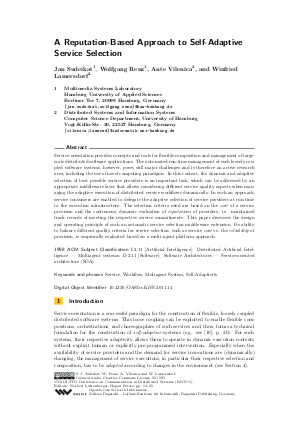A Reputation-Based Approach to Self-Adaptive Service Selection
Authors Jan Sudeikat, Wolfgang Renz, Ante Vilenica, Winfried Lamersdorf
-
Part of:
Volume:
17th GI/ITG Conference on Communication in Distributed Systems (KiVS 2011)
Part of: Series: Open Access Series in Informatics (OASIcs) - License:
 Creative Commons Attribution-NonCommercial-NoDerivs 3.0 Unported license
Creative Commons Attribution-NonCommercial-NoDerivs 3.0 Unported license
- Publication Date: 2011-02-25
File

PDF
OASIcs.KiVS.2011.14.pdf
- Filesize: 1.9 MB
- 12 pages
Document Identifiers
Subject Classification
Keywords
- Service
- Workflow
- Multagent System
- Self-Adaptivity
Metrics
- Access Statistics
-
Total Accesses (updated on a weekly basis)
0Document
0Metadata
Abstract
Service-orientation provides concepts and tools for flexible composition and management of largescale distributed software applications. The automated run-time management of such loosely coupled software systems, however, poses still major challenges and is therefore an active research area, including the use of novel computing paradigms. In this context, the dynamic and adaptive selection of best possible service providers is an important task, which can be addressed by an appropriate middleware layer that allows considering different service quality aspects when managing the adaptive execution of distributed service workflows dynamically. In such an approach, service consumers are enabled to delegate the adaptive selection of service providers at run-time to the execution infrastructure. The selection criteria used are based on the cost of a service provision and the continuous, dynamic evaluation of reputations of providers, i.e. maintained track records of meeting the respective service commitments. This paper discusses the design and operating principle of such an automatic service selection middleware extension. Its ability to balance different quality criteria for service selection, such as service cost vs. the reliability of provision, is empirically evaluated based on a multi-agent platform approach.
Cite As Get BibTex
Jan Sudeikat, Wolfgang Renz, Ante Vilenica, and Winfried Lamersdorf. A Reputation-Based Approach to Self-Adaptive Service Selection. In 17th GI/ITG Conference on Communication in Distributed Systems (KiVS 2011). Open Access Series in Informatics (OASIcs), Volume 17, pp. 14-25, Schloss Dagstuhl – Leibniz-Zentrum für Informatik (2011)
https://doi.org/10.4230/OASIcs.KiVS.2011.14
BibTex
@InProceedings{sudeikat_et_al:OASIcs.KiVS.2011.14,
author = {Sudeikat, Jan and Renz, Wolfgang and Vilenica, Ante and Lamersdorf, Winfried},
title = {{A Reputation-Based Approach to Self-Adaptive Service Selection}},
booktitle = {17th GI/ITG Conference on Communication in Distributed Systems (KiVS 2011)},
pages = {14--25},
series = {Open Access Series in Informatics (OASIcs)},
ISBN = {978-3-939897-27-9},
ISSN = {2190-6807},
year = {2011},
volume = {17},
editor = {Luttenberger, Norbert and Peters, Hagen},
publisher = {Schloss Dagstuhl -- Leibniz-Zentrum f{\"u}r Informatik},
address = {Dagstuhl, Germany},
URL = {https://drops.dagstuhl.de/entities/document/10.4230/OASIcs.KiVS.2011.14},
URN = {urn:nbn:de:0030-drops-29540},
doi = {10.4230/OASIcs.KiVS.2011.14},
annote = {Keywords: Service, Workflow, Multagent System, Self-Adaptivity}
}
